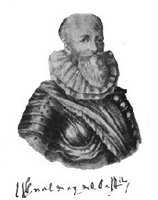 "Properly to extol the adventures that befell us," writes Bernal Díaz del Castillo in his "Preliminary Note" to The Conquest of New Spain, "and the heroic deeds we performed [. . .] would require eloquence and rhetoric far greater than mine" (14).
"Properly to extol the adventures that befell us," writes Bernal Díaz del Castillo in his "Preliminary Note" to The Conquest of New Spain, "and the heroic deeds we performed [. . .] would require eloquence and rhetoric far greater than mine" (14). From the outset, then, Díaz suggests that there is something improper about his account. Its lack of the required eloquence is felt as some kind of somewhat disturbing fault that has to be signalled right at the start.
Absent these skills, Díaz informs us: "What I myself saw, and the fighting in which I took part, with God's help I will describe quite plainly, as an honest eyewitness, without twisting the facts in any way" (14). The hope is that honesty and clarity will perhaps make up for, or even outdo, a rhetorical excess that could be interpreted, indeed, as "twisting the facts." But Díaz has implanted some seeds of doubt as to whether he is a fit chronicler of the story he tells.
Moreover, the issue of who speaks and how, and of who can or should mediate or represent on behalf of others, is central to The Conquest of New Spain. Not least because of the famous, indeed notorious, role of "Doña Marina," otherwise known as "La Malinche," in the events that Díaz relates.
 Díaz takes time out from his narrative, which is otherwise concerned above all with a detailed chronology of the various expeditions to the mainland, above all that led by Hernando Cortes, to give us, almost as an aside, "Doña Marina's Story." But this aside, as is so often the case, contains what is in fact essential.
Díaz takes time out from his narrative, which is otherwise concerned above all with a detailed chronology of the various expeditions to the mainland, above all that led by Hernando Cortes, to give us, almost as an aside, "Doña Marina's Story." But this aside, as is so often the case, contains what is in fact essential. There's a good reason why "before speaking of the great Montezuma," Díaz should want "to give an account of Doña Marina" (85).
Doña Marina was an object of numerous exchanges: her parents, caciques from Paynala, had secretly entrusted her to "some Indians from Xilango," who in turn "gave the child to the people of Tabasco, and the Tabascans gave her to Cortes" (85). Passed around in this way, she clearly picked up a facility with languages, developing a hybrid subjectivity of which the Spanish were crucially to take advantage. She was able to translate between Nahuatl and the language of Tabasco, a language with the former deserter Jeronimo de Aguilar had picked up in the Yucatán: "these two understood one another well, and Aguilar translated into Castillian for Cortes" (86-87).
These two renegade subjects, then, Doña Marina and Aguilar, formed a communicative relay, enabling Cortes to represent himself and to be in turn addressed by the Aztecs and their vassals. In Díaz's words:
This was the beginning of our conquests, and thus, praise be to God, all things prospered with us. I have made a point of telling this story, because without Doña Marina we could not have understood the language of New Spain and Mexico. (87)And in fact time after time, notably in Cholula shortly before the conquering party moved on to Tenochtitlan itself, they made good use of the fact that they were able to gather information about the natives' plans. Díaz reports that this was why "they took us for magicians and said that no plot against us could be so secret as to escape discovery" (203).
So it turns out that the people who are able to speak "properly"--and though we hear relatively little about Aguilar, we often hear how Doña Marina "translated [Cortes's] speech and made it perfectly clear" (199)--are these hybrid, somewhat untrustworthy subjects. The Spaniards are reliant on their powers of translation and persuasion, but also naturally somewhat suspicious of their abilities.
No wonder, too, that Cortes should warn against the way with words apparently possessed by someone such as Bartolomé de las Casas, who "was never tired of talking" about the conquistadors' unwarranted massacres. Las Casas "writes so persuasively that he would convince anyone who had not witnessed the event, or had no knowledge of it, that these and the other cruelties of which he writes took place as he says" (203). But, Díaz insists, we should "beware of this book of his" (203). Its very fluency should alert us that its tale is perhaps too seductive, too convincing.
So in the end Díaz's account is a defence of the improper, of the stumbling, stuttering way in which he himself writes, often informing us of the lapses in his own memory: the chief's name or the idol's name he forgets, for instance (192, 202). It's precisely these lapses in his chronicle, these failures to translate or articulate adequately, that guarantee, Díaz suggests, its truthfulness.
Jack Shafer expresses a very similar sentiment at the end of his mea culpa detailing how he was taken in by one of the many recent scandalous writing "frauds" (JT Leroy, James Frey), in this case Stephen Glass: "Anyone can doubt a bad writer. It's the good ones who need watching."
No comments:
Post a Comment